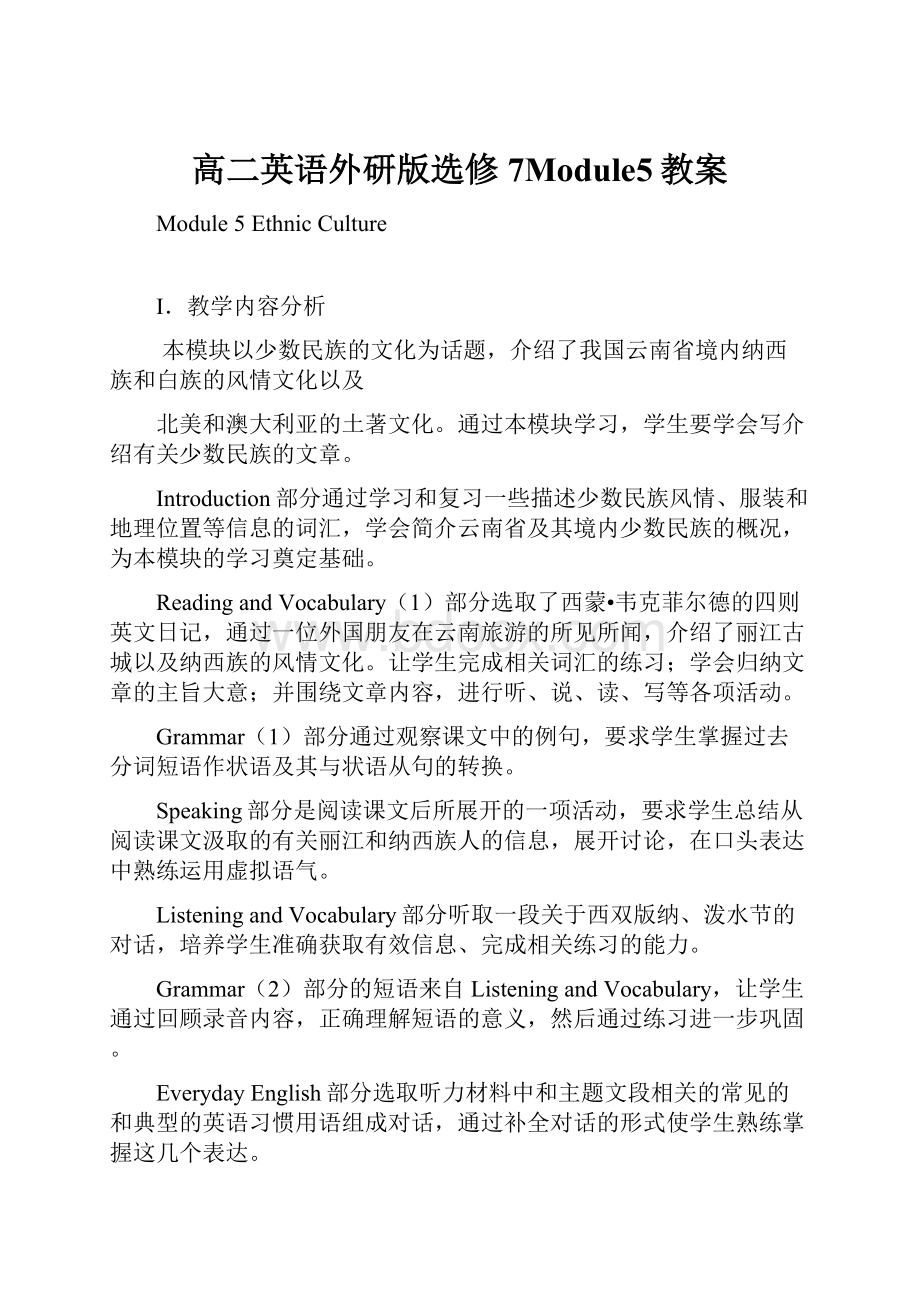高二英语外研版选修7Module5教案.docx
《高二英语外研版选修7Module5教案.docx》由会员分享,可在线阅读,更多相关《高二英语外研版选修7Module5教案.docx(30页珍藏版)》请在冰豆网上搜索。

高二英语外研版选修7Module5教案
Module5EthnicCulture
I.教学内容分析
本模块以少数民族的文化为话题,介绍了我国云南省境内纳西族和白族的风情文化以及
北美和澳大利亚的土著文化。
通过本模块学习,学生要学会写介绍有关少数民族的文章。
Introduction部分通过学习和复习一些描述少数民族风情、服装和地理位置等信息的词汇,学会简介云南省及其境内少数民族的概况,为本模块的学习奠定基础。
ReadingandVocabulary
(1)部分选取了西蒙•韦克菲尔德的四则英文日记,通过一位外国朋友在云南旅游的所见所闻,介绍了丽江古城以及纳西族的风情文化。
让学生完成相关词汇的练习;学会归纳文章的主旨大意;并围绕文章内容,进行听、说、读、写等各项活动。
Grammar
(1)部分通过观察课文中的例句,要求学生掌握过去分词短语作状语及其与状语从句的转换。
Speaking部分是阅读课文后所展开的一项活动,要求学生总结从阅读课文汲取的有关丽江和纳西族人的信息,展开讨论,在口头表达中熟练运用虚拟语气。
ListeningandVocabulary部分听取一段关于西双版纳、泼水节的对话,培养学生准确获取有效信息、完成相关练习的能力。
Grammar
(2)部分的短语来自ListeningandVocabulary,让学生通过回顾录音内容,正确理解短语的意义,然后通过练习进一步巩固。
EverydayEnglish部分选取听力材料中和主题文段相关的常见的和典型的英语习惯用语组成对话,通过补全对话的形式使学生熟练掌握这几个表达。
SpeakingandFunction部分通过复习听力材料中的短语,要求学生正确运用常见的表示询问更多信息的口语表达法。
ReadingandVocabulary
(2)部分是一篇介绍白族文化的文章,通过快速阅读,培养学生捕捉重点信息,把握细节信息的能力,并为本模块的写作做好铺垫。
Writing部分通过阅读课文中提供的有关信息,模仿ReadingandVocabulary
(2)有关描写白族文化的写作结构,写一篇介绍少数民族—基诺族的文章。
ReadingPractice部分要求学生根据文章标题,猜文章体裁;根据文章主要信息,猜测文章大体内容;培养学生在阅读中获取主要信息的能力。
CulturalCorner部分介绍了北美和澳大利亚的土著文化,通过阅读,进一步拓展学生获取信息的能力,并和我国少数民族的文化习俗进行比较,教育学生热爱民俗文化。
Task部分综合本模块所学技能和知识,在小组讨论的基础上,根据所提供的信息,利用上网等查找的资料,撰写一篇文章,完成书面介绍一个民族的任务。
ModuleFile部分对本模块学习内容分项进行归纳,帮助学生反思和检验已学内容。
II.教学重点和难点
1.教学重点:
(1)掌握一些与我国少数民族有关的词汇或短语。
(2)学习过去分词作状语及短语动词的用法。
(3)学习常见的表示询问信息的口语表达。
2.教学难点:
(1)听懂与少数民族及其习俗有关的介绍并获取信息,正确理解新学词汇、短语的含义。
(2)正确恰当地使用过去分词。
(3)学会在阅读过程中根据文字表面意思正确推断其深层含义。
(3)学会从人口、地理位置、语言、经济、风俗习惯等方面来介绍少数民族。
III.教学计划
本单元分六个课时:
第一、二课时:
Introduction,ReadingandVocabulary
(1),Speaking,Grammar
(1)
第三课时:
ListeningandVocabulary,Grammar
(2),EverydayEnglish,SpeakingandFunction
第四课时:
ReadingandVocabulary
(2),Writing
第五课时:
ReadingPractice,CulturalCorner
第六课时:
Task,ModuleFile
IV.教学步骤
Periods1~2Introduction,ReadingandVocabulary
(1),Speaking
TeachingGoals:
1.ToarouseSs’interestinlearningaboutethnicculture.
2.TogetSstolearnsomewordstodescribetheethnicminoritiesinYunnan.
3.TogetSstoknowsomethingaboutYunnanprovinceandtheethnicminoritiesinYunnan.
4.TohelpSslearnhowtotalkaboutethnicminorities.
5.ToenableSstoknowhowtouseV-edformasadverbials.
TeachingProcedures:
Step1.Introduction
1.AskSstoanswerseveralquestionsinordertointroducesomethingaboutYunnantoarouseSs’interestinethnicculture.
(1)Howmanyprovincesarethereinourcountry?
(2)Thereisaverybeautifulprovinceinthesouthwestofourcountry.Itsnamemeans“beautifulcloudsinthesouth”.Whichprovinceisit?
(3)Howmuchdoyouknowaboutit?
(4)Aretheremanyethnicminoritiesinthisprovince?
ThenshowSssomepicturesaboutYunnanandintroduceitinbriefaccordingtotheinformationinActivity1onpage57.
此处有三幅图
2.AskSstodescribetheclothesthewomaniswearinginthepictureinActivity2onpage57.
Step2.ReadingandVocabulary
(1)
1.Pre-reading
LetSshaveadiscussionabouttheethnicminoritiesinYunnan.
2.Fastreading
AskSstoreadthetextquicklytogetthemainsubjectsofeachparagraph.
SuggestedAnswers:
Para1:
YunnanLijiang
Para2:
theoldtown
Para3:
Naxiethnicgroup
Para4:
Naxilanguage
Para5:
Naximusic
Para6:
Simon’sfeeling
3.Intensivereading
(1)AskSstoreadthepassagecarefullyandfindthewordsgiveninActivity2inthepassage.
(2)AskSstoreadthetextoneparagraphafteranotherandanswerthefollowingquestions:
Para1:
①InwhatwayistheYunnanlandscapevaried?
Para2:
②WhydotouristsgetlostinLijiang?
Para3:
③InwhatwayareNaxiwomenunusual?
Para4:
④WhatisunusualabouttheNaxilanguage?
⑤HowdotheNaxibelievetheirpeoplestarted?
Para5:
⑥WhyisNaximusicfamous?
Para6:
⑦What’sthefeelingofSimon?
(3)AskSstochoosethecorrectanswerstoActivity4onPage60.
(4)AskSstoanswerthequestionsinActivity5.
Step3.Speaking
1.AskSstotalkaboutwhattheyhavelearntaboutLijiangandtheNaxipeople.
2.AskSstorole-playinpairs:
StudentAactsSimonandStudentBactshisfriendathome.Now,StudentBisaskingSimonaboutYunnan.
Foryourreference:
StudentB:
Hi,haven’tseenyouforalongtime.Wherehaveyoubeen?
StudentA:
IhavevisitedYunnanrecently.
StudentB:
HaveyoubeentoLijiang?
StudentA:
Yes.Itisaverybeautifulcity.
StudentB:
…
3.AskSstoreadthroughtheinstructionsandexamplesinActivity2onPage61andthenasksomeSstogivetheiropinions.
Step4.LanguagePoints
1.Listening
AskSstolistentoorreadthepassagealongsidethetapetocorrecttheirpronunciation.
2.Wordstudy
AskSstofillintheblanksaccordingtothetexttolearntheimportantwords.
Itisthe
(1)thatimpressSimonmost,thoughhehasbeeninYunnanfortwomonths.Downinthesouth,inXishuangbanna,it’svery
(2).Lijiangishalfnewandhalfoldtown.Theoldtownisonthesideofamountainand(3)itisthe5,500meterYulongXueshangMountain,itspeak(4)withsnow.Lookingfromthe(5)ofthemountains,Simonthinksthattheoldtownisa(6)ofcanals,littlebridgesandtinycobbledstreetsthattouristsget(7)in.
Simonhasspentseveralafternoons(8)inacaféintheoldtownsquare,just(9)people.ThecultureofNaxiis(10).Itisthe(11)whorunNaxisociety,anduntilrecently,Naxiwomeninheritedall(12).TheNaxistillwear(13)costume.Naxicultureisparticularlyfamousforits(14)whichhasnotchangedforeightcenturies,(15)fromfathertoson.AmongthericherNaxipeople,(16)ofthismusicshowedthatyouwerearealgentleman.
SimonhaslearnedalotabouttheNaxicultureduringhistour,andheunderstandsthathowever(17)wemayappeartobeatfirst,weareallthesame,all(18).
SuggestedAnswers:
(1)variedlandscape
(2)tropical(3)opposite(4)covered(5)slopes(6)maze
(7)lost(8)sitting(9)watching(10)fascinating(11)women(12)property
(13)traditional(14)music(15)passed(16)knowledge(17)however(18)equal
3.Explanantion
AskSstoworkingroupsanddiscusstheimportantanddifficultlanguagepoints.
(1)Theoldtownisonthesideofamountainandoppositeitisthe5,500metreYulongXueshanMountain,itspeakcoveredwithsnow.(line8,para1)
古城依山而建,对面是海拔5,500米的玉龙雪山,山顶覆盖白雪皑皑。
itspeakcoveredwithsnow是由“名词+过去分词”构成的独立主格结构。
下面介绍这一语法项目:
◆独立主格结构的构成:
名词(代词)+现在分词\过去分词\形容词\副词\不定式\介词短语等。
◆独立主格结构的特点:
①独立主格结构的逻辑主语与句子的主语不同,它独立存在。
②独立主格结构一般有逗号与主句分开。
◆独立主格结构的句法功能:
定语或状语。
如:
Weatherpermitting,wearegoingtovisityoutomorrow.
Hestoodthere,hishandraised.
ClosetothebankIsawdeeppools,thewaterbluelikethesky.
Thelightsoff,wecouldnotgoonthework.
OurEnglishteachercameintotheclassroom,papersinhand.
注:
独立主格结构是高考考点之一。
如:
Isendyou100dollarstoday,therest________inayear.(2005,湖南)(Key:
C)
A.followsB.followedC.tofollowD.beingfollowed
(2)Seenfromabove,theoldtownisamazeofcanals,littlebridgesandtinycobbledstreetsthattouristsgetlostin.(lines3-6,para.2)从上面看,古城就是一座由沟渠、小桥和鹅卵石铺成的街巷构成的迷宫。
Seenfromabove为过去分词短语作状语,与theoldtown之间是被动关系。
此句为过去分词短语作状语。
(3)Forexample,itisthewomenwhorunNaxisociety,anduntilrecently,Naxiwomeninheritedallproperty.例如,管理纳西族社会的是妇女,而且近来还是由纳西族的妇女继承全部财产。
◆itisthewomenwhorunNaxisociety.为强调句结构,被强调的是主语thewomen。
强调句的基本结构:
Itis\was+被强调部分+that\who+其余部分。
被强调的可以是主语、宾语和状语等,如果被强调的是人用that或who;其它用that。
如:
ItisIwhoteachyouEnglish.
Iwashethatbrokethewindowyesterday.
Itwaswhathesaidjustnowthatmademeunhappy.
强调句型是高考常考的考点之一。
如:
①(2006山东)Ijustwonder_______thatmakeshimsoexcited.
A.whyitdoesB.whathedoesC.howitisD.whatitis(Key:
D)
②(2005天津)Itiswhatyoudoratherthanwhatyousay________matters.
A.thatB.whatC.whichD.this(Key:
A)
◆runvt控制;管理
Myfatherranacamerastorelastyear.
Hehasnoideaofhowtorunabusiness.
(可根据需要简单回顾run的其它常见用法)
◆inheritvt继承,遗传,传给
Sheinheritedalittlemoneyfromhergrandfather.
Sheinheritedallhermother’sbeauty.
Thisgovernmenthasinheritedmanyproblemsfromthepreviousone.
(4)Theysitinsmallcirclesinthesquare,withtheirbabiesontheirbacks,completelyuninterestedinthetourists.她们围成小圈坐在广场上,身背孩子,对游客丝毫不敢兴趣。
此句是由“with+名词+介词短语”构成的with复合宾语结构。
completelyuninterestedinthetourists.为形容词短语作状语。
with复合宾语结构的构成:
with+宾语+宾语补足语。
在句子中充当状语和定语。
其中宾语由名词或代词承当,宾语补足语常见的有形容词、副词、介词短语、不定式、现在分词和过去分词。
注:
with复合宾语结构在高考中是常考的考点之一。
如:
①(2005北京)Icouldn’tdomyhomeworkwiththatnoise________.
A.goingonB.goesonC.wentonD.togoon(Key:
A)
②(2004北京)________twoexamstoworryabout,Ihavetoworkreallyhardthisweekend.
A.WithB.BesidesC.AsforD.Becauseof(Key:
A)
③(2004福建)Itwasapitythatthegreatwriterdied_________hisworksunfinished.
A.forB.withC.fromD.of(Key:
B)
④(2002上海春)Withalotofdifficultproblems_______,thenewly-electedpresidentishavingahardtime.
A.settledB.settlingC.tosettleD.beingsettled(Key:
C)
(5)Thisstoryisshowninpicturesinbooksputtogetherinthe10thcentury,…(lines11-14,para.4)在10世纪编集的书里能找到关于这个传说的图画……
puttogether意思是把……放在一起,把……合并起来;加起来,合并起来。
如:
Itiseasiertotakeamachinetopiecesthantoputittogetheragain.
Yourdepartmentspentmorelastyearthanalltheotherdepartmentsputtogether.
Consideringherage,thegirl’sletterisverywellputtogether.
(6)Everyonelistenedasifsomeonehadputaspellonthem.每个人都像着了魔,听得如痴如醉。
此句为asif引导的状语从句,谓语动词hadput是与过去事实相反的虚拟语气。
如:
Hewasshakingwithfrightasifhehadseenaghost.
Step5.Homework
1.AskSstofinishtheexercisesofReading,VocabularyintheWorkbook.
2.AskSstoPreparefortheListeningclass.
3.AskSstotrytowriteanarticleaboutanethnicminority.Theycanusebooks,magazinesandInternet.